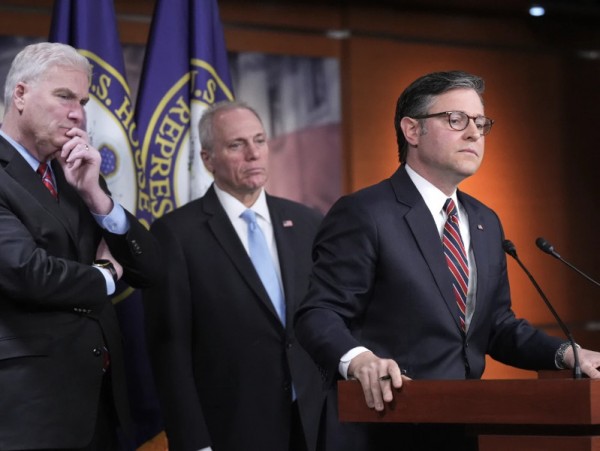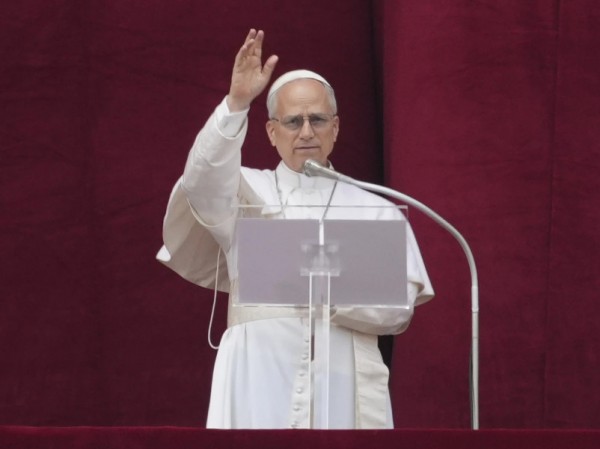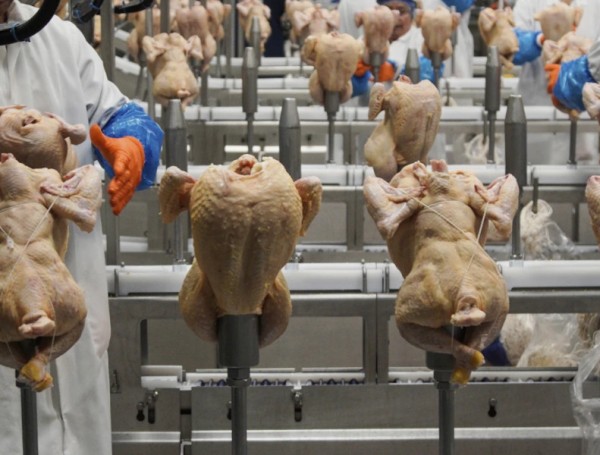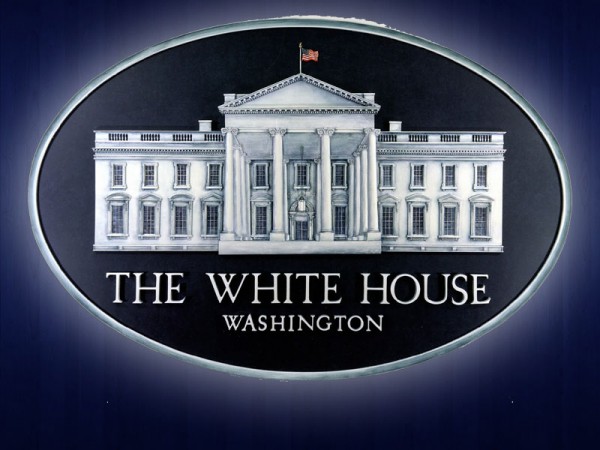WASHINGTON (AP) — The Supreme Court seemed likely to uphold a law that would ban TikTok in the United States beginning Jan. 19 unless the popular social media program is sold by its China-based parent company.
Hearing arguments in a momentous clash of free speech and national security concerns, the justices seemed persuaded by arguments that the national security threat posed by the company’s connections to China override concerns about restricting the speech, either of TikTok or its 170 million users in the United States.
Here is the Latest:
___
The Chinese embassy in Washington issued a statement on Friday criticizing the U.S. government for using state power to suppress TikTok and said Beijing will “take all necessary measures to resolutely safeguard its legitimate rights and interests.”
“The U.S. has never found evidence that TikTok threatens U.S. national security, but it has used state power and abused national security reasons to unreasonably suppress it, which is not fair or just at all,” said Liu Pengyu, the embassy spokesman. “The U.S. should truly respect the principles of market economy and fair competition, stop unreasonably suppressing companies from other countries, and provide an open, fair, just and non-discriminatory environment for companies from all countries to invest and operate in the U.S.”
Creators who spoke at TikTok’s press conference on Friday expressed dismay that the platform they’ve relied on could soon be banned.
Paul Tran, co-founder of the skin-care company Love and Pebble, said he and his wife built the company on the app and is hoping for a solution that would protect national security and preserve access to the app.
“The First Amendment isn’t a relic of the past. It’s a living promise that must be defended in our digital age,” he said.
Memphis cookbook author Chloe Joy Sexton said she joined TikTok when her job fired her because she was pregnant and it allowed her to start her business, Chloe’s Giant Cookies.
“I have now shipped thousands of cookies all over the world and even published a cookbook as a small business without a lot of capital,” she said. “I rely almost entirely on TikTok to market my products.”
She said no other platform can replace TikTok.
“I have tried posting this same exact content on other social media apps without anywhere near the same access, same success.”
Mississippi hip-hop artist Christopher Townsend said he started his TikTok account to share his political views and material from the Bible. Without the app, he said he would lose a platform that allows him to share his views in a way that another platform has not.
The lawsuit from the content creators was filed last May, shortly after President Joe Biden signed the measure into law. TikTok is covering the legal costs for the lawsuit, which was consolidated with the complaint filed by the company and other challenge brought by a group called BASED politics.
TikTok’s lawyer spoke at a press conference Friday, saying the Supreme Court justices questioned both sides closely and they’re hopeful about the decision.
“They put us through our paces,” Noel Francisco said at a news conference after arguments.
The app has a massive U.S. user base amounting to half of all Americans, he said.
Francisco emphasized that the U.S. has not presented evidence that China has attempted to manipulate content on TikTok’s U.S. platform or gather U.S. user data through TikTok.
“This country has never taken a step of shutting down a speech platform, much less such an important speech platform,” he said. “You don’t shut down a speech platform because you’re worried about speech that’s dangerous.”
Skip Chapman, co-owner of KAFX Body in Manasquan, N.J., which makes and sells natural deodorants, listened the oral arguments and said he’s worried since he depends on TikTok for 80% to 90% of his sales. He spent six months trying to diversify going on Amazon and other platforms, but hasn’t found the traction he has on TikTok.
“There’s really no replacement for this app,” he said. “This is my livelihood. Seven million small business owners are really holding their breath right now as we wait and see what happens.”
Lee Zavorskas, a TikTok creator and a licensed esthetician based in New Hampshire, said she makes nearly half of her income on the platform, where she earns money promoting products for other businesses. She said she could not listen to the Supreme Court oral arguments on Friday due to stress caused by the case. Instead, she spent her time building a YouTube channel.
The Supreme Court can normally take months to issue decisions, but this case is expected to be much quicker. With the law scheduled to go into effect in less than two weeks, the justices could take action in the coming days.
In wrapping up, Prelogar said plenty of teenagers using the app might not be at all concerned about any risks to national security, but data gathered by the app could come back to haunt them and the country if they grow up to serve in the military or work for the government.
“For the Chinese government to have this vast trove of incredibly sensitive data about them, I think, obviously exposes our nation as a whole to a risk of espionage and blackmail,” she said.
In rebuttal, TikTok’s lawyer argues that the government didn’t try less restrictive measures to deal with national security concerns before the law forcing a sale or ban.
“If the First Amendment means anything, it means the government cannot restrict speech in order to protect us,” Francisco said. “That’s precisely what this law does from beginning to end.”
As he was wrapping up, attorney for the creators, Fisher argued that if data security was the main issue for Congress, then it would have also regulated Chinese companies like ecommerce sites Temu and Shein, which collect massive amounts of data on their users.
“It raises the question whether the TikTok case precedent, once settled, would have extended implications for other active Chinese mobile applications in the U.S. like Shein and Temu,” said Winston Ma, a professor at New York University’s school of law.
Kavanaugh asked Prelogar if the President can decline to enforce the law.
Trump, who previously tried to ban TikTok while he was in the White House, has asked the Supreme Court to put a pause on the law so he could pursue a “political resolution” to the issue.
Prelogar said even if a non-enforcement policy were announced, Trump would want to “review” all the updated national security information that has come in over the last four years.
Justice Kavanaugh pressed Prelogar about the government’s two stated national security risks.
While the arguments about data collection concerns seem “very strong,” the fears about content manipulation “raise much more challenging questions.”
Prelogar said that if the court thinks the data collection reason is enough to uphold the law, the justices don’t have to get to the content-manipulation argument.
Prelogar is trying to quiet concerns among some justices that if TikTok were to shut down in nine days, it would never re-appear. TikTok could resume operations once it’s sold by ByteDance, and the ban itself might prompt a sale, she said. “It might be just the jolt Congress expected the company might need,” Prelogar said.
During the hearing, Prelogar also brought up a publicized incident in 2022 that raised concerns about TikTok in Washington.
In December 2022, TikTok’s parent company ByteDance disclosed that four employees gained access to data about two reporters and people connected to them while investigating how company information was leaked. ByteDance said the employees had, for instance, looked at the IP addresses of two journalists to try to determine if they were in the same location as ByteDance employees suspected of leaking confidential information. The employees were fired.
Foreign governments have been accused of launching several influence operations across several social media platforms.
The Justice Department alleged last year that several right-wing influencers popular on YouTube worked unknowingly for a company that was a front for a Russian influence operation. In September, TikTok said it removed accounts associated with Russian state media for engaging in “covert influence operations” ahead of the U.S. presidential election.
U.S. officials and outside experts have also cited examples of China-linked actors generating false news reports and social media posts.
Conservative Justice Neil Gorsuch asks whether the Biden administration’s argument is a “paternalistic point of view.”
“Don’t we normally assume that the best remedy for problematic speech is counter speech?”
TikTok, he said, has said they would post a warning that the content could be manipulated by the Chinese government.
Prelogar said that kind of warning wouldn’t be enough to counterbalance any misinformation spread, but Gorsuch appears to remain skeptical.
Solicitor General Elizabeth Prelogar, who represents the Biden administration, said in her opening statement that the Chinese government’s “control over TikTok” gives it a potent weapon for covert influence operations.
She argued the app poses a “grave threat to national security” by collecting “vast amounts” of personal data that the company could be compelled to hand over to the Chinese government.
To date, the U.S. hasn’t provided public evidence to show the Chinese authorities tinkered with TikTok to gain data on or influence Americans.
People who create content for TikTok don’t want to just go to another platform, Fisher said. He’s representing creators who are “not famous people … they’re ordinary American citizens whose content that they create on the platform gets privileged by way of the quality of that content.”
TikTok’s algorithm is especially helpful to those creators, and other companies have not been able to copy it, he said.
Giving the government power to ban platforms because of their owners’ viewpoints sets a dangerous precedent, he argued.
Justice Sonya Sotomayor on Friday asked questions about the type of data that TikTok collects, saying from her readings of the briefs “there was a lot of data that TikTok collects” compared to any other website.
In an analysis published in 2021, the University of Toronto’s nonprofit Citizen Lab said TikTok and Facebook collect similar amounts of user data, including device identifiers that can be used to track a user and other information that can piece together a user’s behavior across different platforms.
Roberts picks apart Fisher’s argument that banning TikTok violates American users’ free speech rights.
“Congress is fine with the expression,” Roberts said. “They’re not fine with a foreign adversary, as they’ve determined it is, gathering all this information about the 170 million people who use TikTok.”
If national security concerns outweigh First Amendment fears in the eyes of the Supreme Court, they presumably would be more likely to uphold the law.
Jeffrey Fisher, a Stanford law professor representing creators on the wildly popular app, is now making his arguments.
Fisher begins with a pitch to conservative justices, by invoking their preferred way of evaluating whether laws, especially regarding speech and gun rights, are constitutional. “The act and the reasons behind it defy our history and traditions,” Fisher said,
“American creators have the right to work with the publisher of their choice,” Fisher said, answering questions from Justice Clarence Thomas about how exactly their rights are violated.
TikTok creators – as well as small business owners – have been anxiously waiting for a decision on the case, which could upend their livelihoods. Many creators rely on the platform for income, and have credited the platform for giving them visibility that other platforms did not.
When asked by justice Amy Coney Barrett on whether TikTok can be recreated in any way, Francisco said any new TikTok would be a “fundamentally different platform” with different content.
Experts have said the Chinese government is likely to block any sale of the TikTok algorithm under the country’s revamped export laws. Investors interested in the purchasing platform have also acknowledged that even if TikTok is sold, it would have to be rebuilt with new technology.
Noel Francisco, attorney for TikTok and ByteDance said if ByteDance loses the case and there’s not a divestiture TikTok will go dark on Jan. 19.
Trump has also asked for a pause in the law to negotiate a deal, and Francisco, who served in his first administration, said “we might be in a different world again” after he takes office Jan. 20. He urged the court to consider a preliminary injunction.
“It makes perfect sense to issue a preliminary injunction and buy everybody a little breathing space,” he said. “A short reprieve here would make all the sense in the world.”
Justice Brett Kavanaugh confronts TikTok’s lawyer about U.S. concerns that China is accessing information on tens of millions of Americans, especially teenagers and people in their 20s, with whom TikTok is especially popular.
“That seems like a huge concern for the future of the country,” said Kavanaugh, whose own daughters are in that age range.
Francisco responded that the government hasn’t shown definitive evidence of that happening.
In a blog post on its official social media account, China’s state broadcaster raised concerns of lack of transparency from the U.S. government and said the U.S. government has failed to produce evidence that Beijing has attempted to pressure TikTok.
A trending opinion on China’s social media is that TikTok has offered a “more comprehensive and positive” understanding of China and reduced “negative, stereotypical” views towards China.
As often happens at the Supreme Court, the justices appear to be poking at what they consider the weakest part of Francisco’s argument, that TikTok’s constitutional rights would be violated if the law takes effect.
“The law is only targeted at this foreign corporation, which doesn’t have First Amendment rights,” Justice Elena Kagan said.
TikTok’s lawyer argues that when the app is being used in the U.S., it does have First Amendment rights, as do the creators that use the platform.
Justice Neil Gorsuch brings up the possibility that TikTok could be sold to other owners in the U.S., which would allow the app to stay available even if the law is upheld.
TikTok says that would be hard under the Jan. 19 deadline in the law, but Gorsuch asks – “is a sale possible given more time?”
It would be “exceedingly difficult under any time frame,” Francisco said.
Attorney Noel Francisco, who represents TikTok and its Chinese parent company, ByteDance, said said TikTok Inc, which runs TikTok’s the U.S. platform, has the ability to “shut down” the platform in the face of Chinese pressure.
TikTok presented a draft agreement to the U.S. government in 2022. The company has said a provision in that agreement would have required TikTok to put in a “kill switch” that allows the U.S. to suspend the platform if it was found to be non-compliant with the agreement.
Justice Brett Kavanaugh asks about the government’s history of preventing foreign ownership of media outlets, a factor cited by an appeals court panel that upheld the law.
Justice Samuel Alito, for his part, grilled Francisco about whether foreign ownership is an important legal issue in the case.
Chief Justice John Roberts says the “main concern” in the case is that TikTok’s China-based parent company has to cooperate with the Chinese government’s intelligence operations.
Roberts’ take on the case will carry great weight as both the chief and a member of the court’s conservative majority.
Supreme Court arguments over the law that could ban TikTok in the U.S. have begun. Up first is attorney Noel Francisco, who represents TikTok and its Chinese parent company, ByteDance.
If TikTok isn’t sold to an approved buyer, the federal law would prohibit app stores, such as those operated by Apple and Google, from offering the popular app. It would also bar internet hosting services from hosting TikTok.
TikTok users who already have the app on their phones will continue to have access to it. But new users won’t be able to download the app, and existing ones will no longer be able to receive updates. That will eventually render the app unworkable, the Justice Department has said in court filings.
Thomas was famously silent during arguments for years at a time because he said he relied on written briefs and thought his colleagues interrupted too much.
But when the court started hearing cases remotely during the COVID-19 pandemic, the justices altered their practice and asked questions one by one, instead of the usual free-for-all. Even after they returned to the courtroom, the justices have informally agreed to allow Thomas, the longest-serving member of the court, to go first.
He has asked questions at every argument session he’s attended since the court’s first remote arguments in May 2020.
The court has set aside two hours for arguments, but it wouldn’t be shocking if they go on for an additional hour or more. Since returning to the courtroom following its closure for the coronavirus pandemic, the court operates under lenient rules about time.
TikTok’s parent company, ByteDance, has said it won’t sell the short-form video platform. But some investors have been eyeing it, including Trump’s Former Treasury Secretary Steven Mnuchi n and billionaire businessman Frank McCourt. On Thursday, McCourt’s Project Liberty initiative said it, along with its unnamed partners, presented a proposal to ByteDance to acquire TikTok’s U.S. assets. The consortium, which includes “Shark Tank” host Kevin O’Leary, did not disclose the financial terms of the offer.
TikTok is owned by ByteDance, a technology company based in China. The U.S. says it has two-fold concerns: TikTok collects vast swaths of user data, including sensitive information on viewing habits, that officials argue could fall into the hands of the Chinese government through coercion. Officials have also warned the proprietary algorithm that fuels what users see on the app is vulnerable to manipulation by Chinese authorities, who could pressure ByteDance to shape content on the platform in a way that’s difficult to detect.
The Supreme Court often takes months to decide its most contentious cases, but the justices are expected to signal their views on the TikTok ban in a matter of days.
The law will take effect on Jan. 19, unless the court steps in before then.
So even if the court’s final decision isn’t ready, the justices may well issue a speedy order, either postponing the law’s effective date or rejecting pending emergency appeals to do so. In that event, the court would essentially be telegraphing its views on the constitutionality of the TikTok ban.
The law that could ban TikTok is coming before the Supreme Court on Friday, with the justices largely holding the app’s fate in their hands.
The popular social media platform says the law violates the First Amendment and should be struck down.
TikTok’s parent company is based in China, and the U.S. government says that means it is a potential national security threat. Chinese authorities could force it to hand over sensitive data on the huge number of Americans who use it or could influence the spread of information on the platform, they say.
An appeals court has upheld the law, which bans TikTok unless it’s sold.
The law is set to take effect Jan. 19, the day before a new term begins for President-elect Donald Trump, who has 14.7 million followers on the platform. The Republican says he wants to “save TikTok.”
Solicitor General Elizabeth Prelogar, representing the Biden administration, will be making her final arguments as the administration’s top Supreme Court lawyer. A political appointee, Prelogar will be out of a job when Donald Trump becomes president.
Prelogar’s predecessor as solicitor general was Noel Francisco, whom Trump picked for the job in his first White House term.
Back in private practice, Francisco is representing TikTok and its Chinese parent company, ByteDance. The third highly experienced lawyer arguing the case is Jeffrey Fisher, a Stanford law professor who represents content creators and TikTok users. Fisher has made 49 arguments before Friday.
Restrictions on speech often are reviewed under the highest level of scrutiny, known as strict scrutiny. Laws only rarely survive when courts apply strict scrutiny.
But Judges Douglas Ginsburg and Neomi Rao, two of the three appellate judges who upheld the law, said the TikTok ban is among the rare laws that would withstand strict scrutiny. The third member of the panel, Judge Sri Srinivasan, voted to uphold the law under heightened scrutiny, a level below strict scrutiny. Lawyers for the companies, content creators and TikTok users want the justices to use strict scrutiny and strike down the law.
Many small business owners say it would significantly hurt their businesses if TikTok gets banned and that contingency plans like shifting platforms wouldn’t help because their followers found them on TikTok.
“I am worried because there is no preparation for this,” said Desiree Hill of Crown’s Corner Mechanic in Conyers, Georgia. She boosted her business by posting videos about cars on TikTok.
“It holds such a significant place in regards to my customer base and how I reach customers, that if I lose TikTok, I will lose a large part of my business or I will lose my ability to grow,” she said.
As the trade and tech war between the U.S. and China heated up during Trump’s first term, Beijing adopted an export control law to restrict the sale of algorithm, apparently to protect China’s technological advantages from falling into foreign hands.
The Chinese law makes it impossible for ByteDance to divest TikTok in its full. ByteDance, a private tech company that has been turned into a symbol of China’s resistance to U.S., would displease Beijing if it should sell off TikTok without putting on a strong fight.
Observers also believe Beijing prefer ByteDance to shut down TikTok rather than selling it, should its legal battle fail. At home, the Chinese government has used the case as an example of the U.S. using state power to go after a successful Chinese company. State media have supported ByteDance’s legal actions in the U.S., and public opinion applauds the tech company for standing up against the U.S. government and for breaking the monopoly of western social media.
The law gives ByteDance the option to sell TikTok. But attorneys for the two companies have said TikTok would have to shut down by Jan. 19 because divestment is technologically and commercially impossible.
A sale of the platform without the algorithm — which Chinese authorities are also expected to block any potential divesture plan — would turn the U.S. version of TikTok into an island, separate from all other global content.
The company sued the government over the law late last year.
TikTok had negotiated with the Biden administration between 2021 and 2022 to resolve the concerns around U.S. data privacy and potential algorithmic manipulation. In court documents, it has accused the administration of essentially walking away from those negotiations after it presented a draft agreement in August 2022.
But the Justice Department has said the Biden administration concluded the proposal was “insufficient” because it would maintain TikTok’s ties to China. The agency said the Executive Branch also could “neither trust ByteDance to comply nor detect noncompliance before it was too late.”
Attorneys for TikTok — and ByteDance — have accurately noted the U.S. hasn’t provided evidence to show that the company handed over user data to the Chinese government, or manipulated content for Beijing’s benefit in the U.S..
They have also argued the law is predicated on future risks, which the Department of Justice has emphasized pointing in part to unspecified action it claims the two companies have taken in the past due to demands from the Chinese government.


















